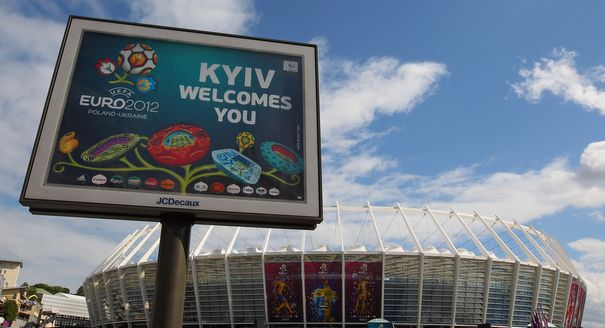The EURO 2012 European Football Championship will kick off later this afternoon in Warsaw amidst controversy surrounding recent political developments in Ukraine, which will be co-hosting the tournament with Poland.
In a short interview, Olga Shumylo-Tapiola discusses the impact that hosting the tournament has had on Ukraine as well as the decision by several EU leaders to boycott the championship. Although their government has failed to live up to the opportunity, she explains, the tournament will give ordinary Ukrainians a chance to show the best of themselves and their country and to break down some of the barriers separating them from their European neighbors.
Will hosting the European Football Championship have any effect on Ukraine’s economy or politics?
Symbolically, the hosting of EURO 2012 in Ukraine and Poland was extremely important for Ukraine. Preparation for the championship was supposed to help address several goals. To significantly develop the country’s infrastructure —many referred to the example of Portugal, which hosted the championship in 2004. To increase the amount of tourism—not only in Kyiv, the country’s capital and the standard destination for visitors, but also in other cities. And last, but not least, to improve Ukraine’s image in Europe.
Unfortunately, none of these goals has been met. Ukraine’s image has suffered significantly due to internal political developments that have led the country to be compared to a dictatorship. Kyiv’s hosting of the championship has consequently been brought into question a number of times.
Nor has hosting the championship helped the economy. The government failed to attract the necessary foreign investment. Instead, the championship was used as a source of personal enrichment by some members of the government and their business associates. Many projects initially planned for the tournament have not been finalized. One could blame the financial crisis and the consequent lack of funds, but this was not the case in Ukraine. All services rendered for EURO 2012 were exempted from regular public procurement procedures, resulting in no competition over bids and kickbacks.
While the number of tourists visiting Ukraine due to EURO 2012 may increase, they are likely to spend less time in the country than in the case of similar sporting events in other places. Some fans—particularly the French and British—plan to fly in and out of Ukraine on the day of the games. Others, who will stay for longer, will unfortunately face the same problems ordinary Ukrainians face on a regular basis. How does one get from Lviv, in the west, to Donetsk, in the east, without a direct train? Is the police there to protect or intimidate? How do you find decent accommodation at a reasonable price?
What impact will the tournament have on the everyday lives of Ukrainians?
The populations of Donetsk, Kyiv, Kharkiv, and Lviv— where the tournament will be held—may not be the happiest in the world because of the tournament. They will have difficulties traveling through their hometowns and going about their daily lives for a number of weeks. Yet, these same people will fulfill a very interesting, and new role during the championship.
They will be the face of Ukraine and while the state and businesses have largely failed to organize properly for EURO 2012, these citizens will step in to replace them and simply share all the best that can only be found in Ukraine. One of the examples is a Facebook group called “Friendly Ukraine” that offers information about accommodation in peoples’ homes for western tourists, transfers from airports, and guides on how to get around cities.
Can the tournament benefit Ukraine’s opposition?
It could, but it is unlikely. The opposition could have used the period in the buildup to the tournament to expose the government’s misuse of state funds, and mobilize society against it. Unfortunately, EURO 2012 will likely be yet another lost opportunity for Ukraine’s opposition.
The opposition has no clear plan of how to use this time, and not necessarily even for revolutionary purposes. They are unlikely to use the tournament to reach out to wider audiences. Some ad hoc activities, such as the existing protest camps in the central square in Kyiv or other towns, may be used but it will not be enough to attract the attention of ordinary citizens or western fans.
What effect will European leaders’ boycott have on Ukraine’s leadership?
So far the boycott has not had a significant impact on Ukraine’s leadership. Unfortunately, it has only contributed to irritating the government and has not forced them to address the country’s major democracy problems. The absence of EU leaders at the opening ceremonies in Kyiv may further upset the Ukrainians. Yet many officials in Kyiv honestly do not understand why EU leaders mixed politics with sport.
What can ordinary Europeans visiting Ukraine learn about the country?
First of all, many of them will learn that Ukraine exists. They will learn that they will not be able to understand much, as many signs are still in Cyrillic and most Ukrainians do not speak foreign languages. They will also probably find out that Ukraine does not function as many EU countries do, where trains arrive on time, roads are smooth, and it is possible to find accommodation for all price ranges.
At the same time, I hope they will learn that Ukrainians are hospitable, proud of their country, and willing to share the best it has to offer with foreigners—like food, culture, and nature. I would advise European travelers to reach out to these ordinary Ukrainians despite the language barrier and other difficulties they may face. While for government and businesses, EURO 2012 was primarily an opportunity to pursue their own financial interests and fill their coffers, for many ordinary Ukrainians it is yet another chance to erase the borders between the EU and Ukraine.











